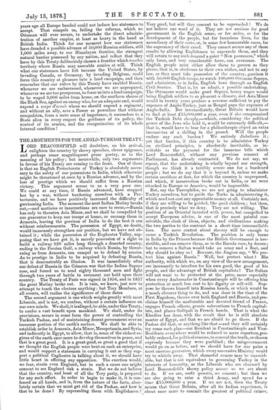TOPICS OF THE DAY.
THE ANGLO-TURKISH TREATY.
WE cannot believe that the English people yet understand the magnitude of the responsibility which her Majesty's Government, by the Secret Treaty of June 4th, have accepted on their behalf. It is nothing less than the duty of protect- ing, controlling, and in the last resort administering the whole of Asiatic Turkey,—that is, of an empire larger than Austria, France, and Spain taken together, separated from their own country by two thousand miles of sea, occupied by sixteen millions of half-civilised and oppressed people, surrounded by formidable enemies, and at present sunk in hopeless anarchy and confusion. If this Treaty is ratified, the British nation pledge themselves to defend Asiatic Turkey through all time and against all foes from within and from without. If Russia five years hence recommences her secular march south- wards, the British people must drive sixty millions of Slays back upon their deserts. If France is irritated with the loss of her influence in Syria, or considers her clients in the Lebanon ill-treated, England must forbid her interference, as an act of hostility to herself. If Persia, under a warlike Shah, redemands her Holy Places and reoccupies them, the Indian Government must declare war on Teheran, in the interest of Turkey. If the Arabs, weary at last of subjection to an equally Mahommedan but inferior tribe, attempt to vindicate their independence, British troops must occupy Mecca, or stand pre- pared to defend Damascus against the assaults of the Desert tribes. If the Armenians of Erzeroum rise on their secular oppressors, English soldiers must be landed at Trebizond, or if Syria once more casts out the Turk, Englishmen must replace him, if the remainder of the world, irritated by a massacre in the Holy Places, appear in arms to forbid. The permanent hostility of Russia, the sleepless jealousy of France, the angry suspiciousness of all Mediterranean Powers must all be defied, rather than any change, beneficial or injurious, should be made in the dominions of a Mussulman family which has, by the consent of its friends, degenerated into dotage, and of a caste with which Englishmen have not one single point of moral or social accord. And all this must be accomplished at all times, often the most unexpected and in- convenient times, by a nation which in peace keeps up an in- sufficient standing army, which has to protect forty Colonies from which she does not draw a soldier, and which is already burdened with the protection, the government, and the civilisation of a fifth of the human race. Merely to be ready to fulfil her duty, England, if sincere in her formal guarantee, must be prepared to maintain at least thirty thousand extra soldiers, besides double that number of Indian auxiliaries, to keep an additional Fleet cruising in Mediterranean waters, and to undertake obligations which, on the most careful calculation, cannot be discharged for less, at first, than ten millions a year. All this, however, tremendous as the work is for a Power without a conscription, and liable to imeutes in every corner of the world, is nothing compared with the further obligations imposed by the Secret Treaty. The Asiatic Empire we are pledged to defend is so situated that it cannot be defended without being first administered. It is so badly governed, that its Treasury is empty, that its cities are decaying, that its peasants are in despair, that its fairest provinces are ravaged by tribes half-brigands, half-patriots, that insurrec- tion, as Lord Salisbury admits in his introduction to the Treaty, even without foreign intrigue, may extend through- out its borders. To prevent such insurrection, to restore order, to allow prosperity to recommence, is imperative, if only for this reason, that until this work is done the mainspring of administration, decent finance, cannot be re-established. No Treasury can be solvent while its officials plunder, while its peasantry live in hourly expectation of marauders, while no man in its great cities can hope for safety for his ac- cumulations. Even if English philanthropists would bear such a situation, English financiers would not, and the common-sense of business men will stimulate the compassion never long dead in Englishmen to bring disorder to a close. Order must be restored at once in Asiatic Turkey, and there is no agency in existence through which to restore it. The Pashas, demoralised by centuries of corrupting ascendancy, will not do the work; and the Christians, enfeebled by centuries of slavery, cannot yet do it. Within three years the people of England will be compelled either to repudiate the Treaty, or sell their soldiers to support barbarians in oppressions reported as accurately as if they occurred in Cornwall, or govern through administrators in whose consciences and competence they can place some trust. We all know which alternative they will choose; they will administer Asiatic Turkey for themselves, will replace the Pashas by English Governors,will guarantee the people by English collectors and English magi- strates, will prohibit resistance by English armies, and will directly rule and administer from Constantinople eastward to the border of Siam, governing, protecting, and taxing the whole of the Western Asiatic world, all the countries on the Eastern border of the Mediterranean, on the Southern border of the Black Sea, and in the Valley of the Euphrates, all India, and as much of Indo-China as is drained by the Burrampooter and the Irrawaddy. If they succeed, if their new possessions revive—as they will revive—they will have made their Govern- ment the earthly Providence of at least three hundred millions of people, all aliens, all discontented—for British rule produces every good result but loyalty—and all liable to huge, aimless, meaningless movements, heaves, as it were, of a sea of population, under some impulse from be- low. Their military liabilities will be such as no empire ever faced,—the garrisoning of a third of the Western world with 100,000 men. Their financial liabilities will be such as even the chiefs of an English Treasury may witness with dismay. Imagine, for one item alone, their liabilities for the railways they must build, commencing with the one already spoken of, the Euphrates Valley scheme, which, at Indian rates, will cost £16,000,000, take 10,000 soldiers to protect it and perhaps, as its use involves a transhipment of goods, be a fai lure after all. And their moral liabilities will be such as may well exhaust the supply of goodness in them, and compel them to declare that they must govern without the impediment of per- petually caring for the happiness of the governed. There never yet was such a task undertaken by a people, least of all by a people already satiated with territory, already overburdened with possessions and responsibilities, already compelled to call to its aid the aid of mercenary swords- men of other races, other creeds, other languages, other objects than its own. Was such a project ever heard of since the days when battle was considered the business of man Our Colonial Empire came to us bit by bit, and the Colonies can be guarded by sea. The Indian Empire came to us bit by bit, often in spite of ourselves ; and India is a secluded peninsula, shut out from the world and unassailable by any force with which England need seriously reckon. But this new Em- pire, threatened by the greatest of military Powers, watched by every Power with jealousy and longing, inhabited by races to whom insurrection is habitual,— this we take voluntarily, for no reason save that at some distant period it should not be taken by Powers who might by possibility threaten our other Empire, where the people, if hostile, could expel us in a week, and if friendly, could place our rule beyond danger from the combined hostility of all mankind.
This is our point to-day,—the magnitude of the task which the British people have suffered to be imposed on them. We have not exaggerated one single item. We have de- liberately omitted to notice the dangers we must meet at Constantinople, where henceforward every revolution will be a revolution against us. We have said nothing of the liabilities which, as the organs of the Government are care- ful to point out, we are incurring in European Turkey, where a rising in the Roumelias may at any moment compel the Sultan to draw all troops from Asia, double all taxes, and up- set all that good administration has secured. We have passed over the preposterous anomaly that we are to guarantee Asia Minor without the right to send an ironclad to its Northern coast. We have said nothing of the hostility of the races, Greeks, Armenians, and Italians, whom, to gain this position for ourselves, we have betrayed. We do not even refer to our re- sponsibilities for Cyprus, a new possession, which has dropped at once to a minor detail ; for the Sultan's outlying provinces ; for Tunis, where Frenchmen and Italians are glaring at each other ; for Tripoli, where fanatic Mussulmans will shake off the Padishah, who is a mere agent of the Infidel ; or for Egypt, where France is watching us with jealous suspicion, and con- fine ourselves absolutely to the four corners of the Treaty. That compels us to do, in addition to our own work, all the work which Turkey has had to do, and to do which, in the very signature of this Treaty, she confesses her own inability. That compels us single-handei to enforce on Turkey all and more than all the reforms which only two
years ago all Europe banded could not induce her statesmen to accept. That compels us, failing the reforms, which no Ottoman will ever secure, to undertake the direct adminis- tration of another empire, at least as heavy in the hand as British India. Think for one moment how our statesmen have dreaded a possible advance of 50,000 Russian soldiers, still 1,000 miles away, to our Himalayan frontier, the strongest natural barrier possessed by any nation, and reflect that they have by this Treaty deliberately chosen a frontier which touches territory where Russia may assemble armies at will. Think what our statesmen have felt because the United States, by invading Canada, or Germany, by invading Belgium, could force this country at pleasure into a land campaign, and then remember that our rulers by this Treaty have enabled Russia, whenever we are embarrassed, whenever we are unprepared, whenever we are too prosperous, to force us into a land campaign, to be waged 3,000 miles from home, on the southern shores of the Black Sea, against an enemy who, for an adequate end, would expend a corps d'arme'e where we should expend a regiment, and without an ally, save a Power so powerless that without compulsion, from a mere sense of impotence, it surrenders to a State alien in every respect the guidance of its policy, the control of its armies, and the reorganisation of its whole internal condition I



































 Previous page
Previous page